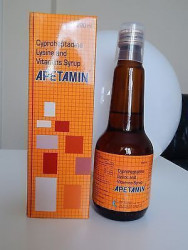Apetamin pills (cyproheptadine) Coupons, Discounts & Cost
Apetamin pills (cyproheptadine) belongs to the group of H1 antihistamine agents. One way to save money on the Apetamin retail cost regardless of income and insurance status is to use Apetamin coupons or discount cards from RXCoupons. Use this Cyproheptadine coupon at this online pharmacy and receive up to 75% off the sale price.
Definition of Apetamin
Apetamin (cyproheptadine) belongs to the group of H1 antihistamine agents. The drug is also used to stimulate appetite.
The maximum concentration of cyproheptadine is reached within the first 2 hours. Approximately 40% of the administered dose is excreted in the urine. 20% is excreted through the intestine.
Apetamin indications: acute and chronic urticaria, serum sickness, hay fever, vasomotor rhinitis, pruritus, eczema, contact dermatitis, atopic dermatitis, angioedema, neurodermatitis, vascular headaches (migraine), anorexia of various origins (anorexia nervosa, idiopathic anorexia).
Precautions for Apetamin
Apetamin is contraindicated in the following cases: hypersensitivity to the drug, angle-closure glaucoma, benign prostatic hyperplasia, urine retention, children under 2 years old, simultaneous administration with MAO inhibitors, pregnancy, lactation.
Breastfeeding should be stopped if you take Apetamin.
Apetamin instructions for use
The first dose of Apetamin should be taken after supper. The maximum daily dose is 32 mg per day.
Adults: the usual daily dose is 12 mg (1 tablet 3 times a day).
Chronic urticaria: 6 mg per day (1/2 tablet 3 times a day).
Acute migraine: 1 tablet once. The total dose should not exceed 8 mg.
Maintenance therapy: 1 tablet (4 mg) 3 times a day will be sufficient.
Anorexia: 1 tablet (4 mg) 3 times a day.
Children under 2 years of age should not use Apetamin pills.
Children aged 2 to 3 years: 0.25 mg/kg per day.
Children aged 3 to 6 years: 4-6 mg per day (1/2 tablet 2 or 3 times a day). The maximum dose is 12 mg per day.
Children aged 7 to 14 years: 8-12 mg per day (1 tablet 2 or 3 times a day). The maximum dose is 16 mg per day.
Use with caution in case of cardiovascular disease, bronchial asthma, hyperthyroidism, hypertension. Do not drink alcohol during treatment.
Apetamin side effects in detail
Possible side effects from taking Apetamin: drowsiness, dry mouth, anxiety, confusion, ataxia, hallucinations, dizziness, nausea, agitation, headache.
CNS: drowsiness, dizziness, headache, anxiety, tremor, ataxia, visual hallucinations.
Cardiovascular system and blood: hypotension, tachycardia, hemolytic anemia, leukopenia, agranulocytosis.
Digestive tract: dry mouth, nausea, vomiting, diarrhea.
Allergic reactions: Quincke's edema, hives, exanthema, anaphylaxis, photosensitivity.
Apetamin overdose symptoms: Apetamin overdose can be accompanied by both CNS oppression and stimulation, especially in infants and children.
Unwanted symptoms in children: agitation, hallucinations, convulsions, mydriasis and pupil immobility, hyperthermia, vascular collapse, coma.
Unwanted symptoms in adults: depression, psychomotor agitation, convulsions, coma; rarely - hyperthermia, skin hyperemia.
Special instructions related to Apetamin
Elderly patients and children require special attention, since they are more sensitive to antihistamines. Patients with chronic renal failure should use lower doses of the drug.
It is contraindicated to take alcoholic beverages during treatment.
Apetamin therapy is contraindicated during pregnancy. Breastfeeding should be discontinued as well.
Apetamin tablets contain lactose. Therefore, consult your doctor if you have lactose deficiency, galactosemia or glucose-galactose malabsorption.
Do not combine Apetamin tablets with ethyl alcohol and other CNS depressant drugs (sedatives, hypnotics and anxiolytics). Be careful if you take MAO inhibitors, tricyclic antidepressants.
Patients during treatment are advised to refrain from driving, as well as performing work associated with an increased risk of unstable behavior.
Storage conditions
Store at a temperature of 15-25° C, out of reach of children.

